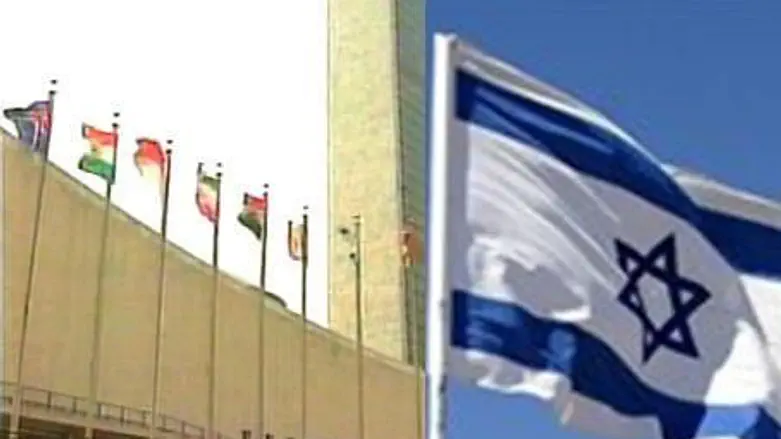
The October 26 edition of the Foreign Policy Journal features an article by its founder and editor, Jeremy R. Hammond, in
Jeremy R. Hammond has offered a sophist-style 'scholarly' refutation of the international foundation for Israel’s establishment in 1948. which he claims that:
which he claims that:
1. The UN General Assembly had no right to propose the partition plan for Israel and the Arabs (which the Arabs rejected, starting the 1948 Israeli War of Independence, ed.)
2. The Arab population was not given the right to self determination because the UN wanted to create the Jewish State
Hebrew University’s Middle East Studies noted lecturer, Dr. Mordecai Nisan, was asked by INN to respond to the article. Here is his response:
It is conventional to accept, at least theoretically, the authority of international law and its institutions as the definitive mechanisms for defining political situations and offering solutions to political conflicts. The alternative is force and violence as the benchmark of history. Certainly that has been a mighty and decisive benchmark considering that the map of the world and the delineation of borders predominantly were decided by war and its results.
In his essay on “The Myth of the U.N. creation of Israel,” Jeremy R. Hammond has offered a sophist-style scholarly refutation of the international foundation for Israel’s establishment in 1948. Basing himself on the intrinsic right of the Arabs of Palestine to the Land, any other claim criterion is nullified: the League of Nations, the United Nations, and Great Britain as the mandatory power of Palestine, are all excluded from legitimately determining the fate of Palestine in the political turmoil of 1947.
As a result of Arab refusal to partition Palestine, and the Jewish determination to secure a state in at least part of Palestine, war was the inevitable reality. At a certain point in early 1948, while fearing war with the Arabs within the country and Arabs from the surrounding Arab countries, Ben-Gurion understood that war was the only scenario on the horizon.
Of course it is a myth to assert or believe that the U.N. created Israel, because it was the Zionist military victory buoyed by an iron-will national tenacity which created a Jewish state in the teeth of Arab hostility and belligerency. It could not have been otherwise. Once Hammond denies authority to law and legally sanctioned international institutions to decide, he – like the Arabs - has pointed to force as the only alternative. The Arabs vitiated the view of the U.N., but to their great loss.
The idea that a minority population, as was the Jewish population in Palestine in 1948, has a right to affirm its national claim is not unknown in the thorny instances of intra-state conflicts. A minority like a majority may also have a rigorous claim to self-determination. It was after all this kind of demographic and ethnic situation which gave birth to Pakistan as a Muslim state in 1947, separate from Hindu-majority India; or, if you like, to Catholic Ireland seceding from the United Kingdom in 1922. Perhaps African Christian/animist southern Sudan will take this momentous step in 2011. In such instances, pluralistic countries dissolve into their distinctive parts, for better or worse.
In Eretz Israel in 1948 and even before, the irreconcilable Jewish-Arab confrontation led to the breakdown of political order and the founding of an independent Jewish state, with Arab–populated areas of Palestine coming under the rule of Jordan and Egypt. Wanting all, in breach of the international decision for partition, the majority Arabs of Palestine ended up with nothing.
Hammond’s line of argument leads to the dissolution of the conflict-management or resolution-capacity of the U.N. And that is probably for the better, considering its endless meddling and globalist interventions in futile ways (read Lebanon), and its contrasting negligence to effectively intervene when the situation demands it (read Rwanda and Darfur).
Obviating its right to deny the Arabs all of Palestine means that the U.N. Partition Resolution 181 is, for Hammond, invalid. That being the case, there is no reason to accept the authority of U.N. Resolution 194 that calls for Palestinian refugee return. An emasculated U.N. cannot be manipulated to be only good for the Arabs and bad for the Jews when that is politically convenient. Hammond argues that the U.N. did not have a right to create Israel, so then it does not have a right to dissolve its existence under the guise of sanctifying resolution 194 from 62 years ago.
It is transparently true that Israel’s founding came through the sword, but one exercised on behalf of the transcending right of an ancient and integral people, the likes of whose special claim to the Land of Israel no other human collectivity can equal whatsoever. To continually hound Israel by raising the question of its legitimacy will only assure, may I suggest, future wars whose results will likely approximate in bold colors the results of 1948.
